09 Jul2019
By Lynn M. Gangone
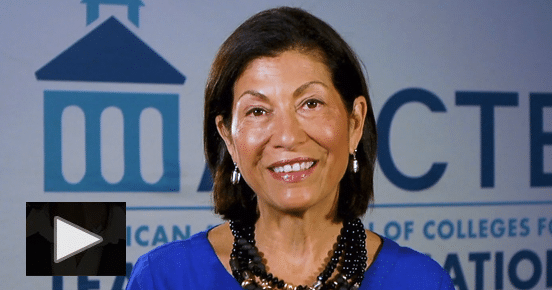 I am excited to report that the AACTE Board of Directors approved a new Strategic Plan framework during their meeting in Washington, DC last month. Our Board adopted new vision and mission statements that are bold, innovative, and will facilitate building the Association’s overall strategic plan. Please take a few minutes to watch the video above (or read the transcript) to learn more about your Association’s new direction.
I am excited to report that the AACTE Board of Directors approved a new Strategic Plan framework during their meeting in Washington, DC last month. Our Board adopted new vision and mission statements that are bold, innovative, and will facilitate building the Association’s overall strategic plan. Please take a few minutes to watch the video above (or read the transcript) to learn more about your Association’s new direction.
AACTE is committed to elevating education and educator preparation through research, professional practice, advocacy, and collaboration. Be a part of our exciting work by actively engaging in our efforts. Learn more about AACTE’s initiatives and how to get involved by visiting aacte.org.
01 Jul2019
By Katrina Norfleet
AACTE board member Donald Easton-Brooks is widely known as a scholar of educational policy and culturally responsive teaching. This year, he released his book Ethnic Matching: Academic Success of Students of Color. In a recent Q&A with AACTE President and CEO Lynn M. Gangone, Easton-Brooks talked about the book and how his research shows diversifying the teaching profession will ultimately improve student’s success. The following summary highlights the conversation.
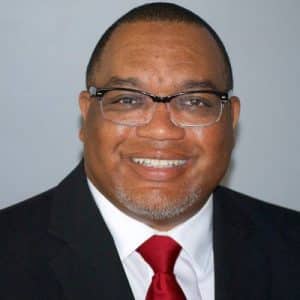 How would you describe the concept of ethnic matching and its importance to student learning?
How would you describe the concept of ethnic matching and its importance to student learning?
What ethnic matching initially suggests is that teachers of color can play a significant role in enhancing the academic experience of students of color. As this research and other research progress, findings have shown that teachers of color can play a significant role in also enhancing the academic experience of white students and can assist in enhancing a more culturally responsive profession as a whole. Therefore, the concept and research related to the concept suggest that we need to diversify teacher education. Mainly because as our communities are becoming more diverse, we are seeing our public schools also becoming more diverse. Yet what is happening is that our educator profession is not growing at a similar rate as these communities of students. The research around the concepts shows that perceived knowledge or knowledge from a preceptive culturally lens can play a role in students’ understanding of concepts, learning, and processing of information. This often can lead to these students being misinterpreted by teachers and feeling somehow misunderstood by teachers if they do not have that cultural lens to understand them. That is what teachers of color can bring to the table that can be of assistance to educational systems.
27 Jun2019
By Lynn M. Gangone

This article by President and CEO Lynn M. Gangone was originally published in the “Empowering Our Educators” supplement to USA Today and on the Education and Career News website. The article and photo are reprinted with permission.
Effective educators are developed, not born. Their preparation begins in colleges and schools of education and persists through the professional development during their careers. As the needs of student learners evolve, so too must our development of educators.
25 Jun2019
By Lynn M. Gangone
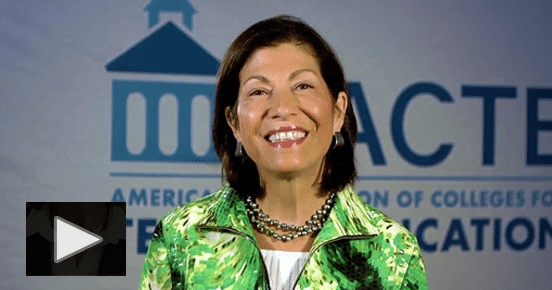
This month, AACTE members, colleagues, and students converged on our nation’s capital and made their voices heard during AACTE’s Washington Week events. From increasing teacher diversity to a renewed respect for the profession, attendees promoted educator preparation and pushed for their representatives’ support in making education the center of American values. Please take a few minutes to watch the video above (or read the transcript) to receive an update on AACTE’s advocacy efforts on your behalf.
Rest assured, AACTE tackles policy issues not only during our annual advocacy week but also throughout the year to continually move forward our legislative agenda. Stay connected to AACTE for up-to-the-minute information on policies and legislation by visiting aacte.org.
20 May2019
By Lynn M. Gangone
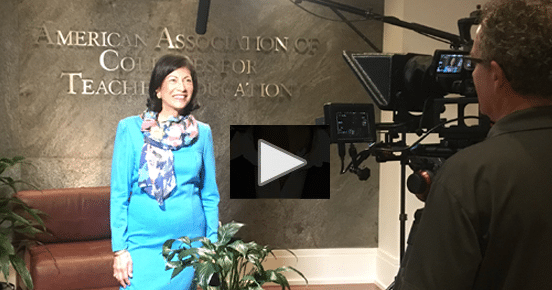
AACTE is committed to being your go-to-resource for the latest information, news, and trends in educator preparation. Being an AACTE member connects you to a vibrant community of educators and a strong network of support. Discover how to maximize your benefits and stay connected with AACTE in this month’s member update. Please take a few minutes to watch the video above (or read the transcript).
AACTE also wants to hear from you. Let us know the greatest challenge you face in educator preparation by emailing us at communications@aacte.org or contacting me directly at lgangone@aacte.org.
21 Nov2018
By Lynn M. Gangone and Renée A. Middleton
These letters to the editor, Don’t Blame Admissions Standards and Ed. Colleges Provide Value first appeared in Education Week on November 13, 2018. Reprinted with permission from the authors.
Don’t Blame Admissions Standards
To the Editor:
Marc Tucker has helped us better understand education systems around the world. Unfortunately, in his recent opinion blog post (“Teachers Colleges: The Weakest Link,” November 1, 2018), he demonstrates less understanding of America’s teacher-preparation programs than he has about programs abroad.
16 Nov2018
By Katrina Norfleet
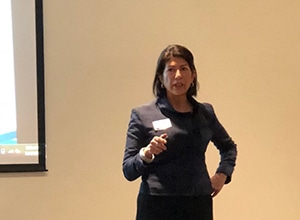
AACTE President and CEO Lynn M. Gangone recently traveled to Indiana where she met with deans of colleges and schools of education throughout the state, and representatives from the State Department of Education and national foundations to discuss educator preparation from a national perspective. Gangone also was invited to be the lead speaker at the Indiana Association of Colleges for Teacher Education’s (INACTE’s) first statewide summit, and presented data from the Colleges of Education: A National Portrait report.
Ena Shelley, an AACTE board member and INACTE member, shared how important it was to hear the trend data. “When you are working within state borders, you think it is just your state, but when you see the trend data—how long teachers are staying or not staying, the demographics—it makes it real,” Shelley said. “I think the report was so important because we really haven’t had a succinct, cohesive report like the National Portrait, which gives us real data to look at … [and ask ourselves] now what can we do about it?”
29 May2018
By Lynn M. Gangone
As the school year nears its end, teachers everywhere are contending with mounting time pressures, waning resources and energy reserves, maybe even an epidemic of spring fever. For some teachers, though, the frenzy and frustrations seem to last all year–and they may feel isolated, underappreciated, and powerless to change the situation. AACTE President/CEO Lynn M. Gangone has this message to encourage them to strengthen their capacity to both support students and thrive as successful members of the professional community.

As a teacher, you’re focused on helping students. You draw from your content knowledge, determine appropriate pedagogy for the particular child and context, and forge connections with resources to support each learner’s growth. What’s more, these practices benefit more than just the young people in your care–teachers, too, thrive with a rich support network in their community and tailored opportunities to learn and grow as professionals.
10 Apr2018
By Lynn M. Gangone
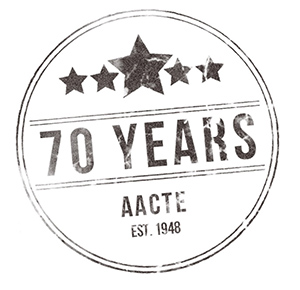
This year marks the 70th anniversary of AACTE’s founding. Created in 1948 as an alliance to boost the quality of teachers being prepared for the country’s growing public school system, our association remains steadfastly focused on the democratic ideal of providing all students equitable access to an excellent education.
AACTE’s platinum anniversary falls at a time when this ideal is still far from being realized, or even universally held, in our society. Many Americans seem to have forgotten what our nation’s founding fathers knew: that quality public education is an essential element of a democracy. John Adams called for the “whole people [to] take upon themselves the education of the whole people”; Thomas Jefferson insisted a civilization could not be both ignorant and free. Over time, persistent activism from the suffragette and civil rights movements expanded the nation’s understanding of whose voices count – of what “the whole people” really means.
30 Jan2018
By Lynn M. Gangone
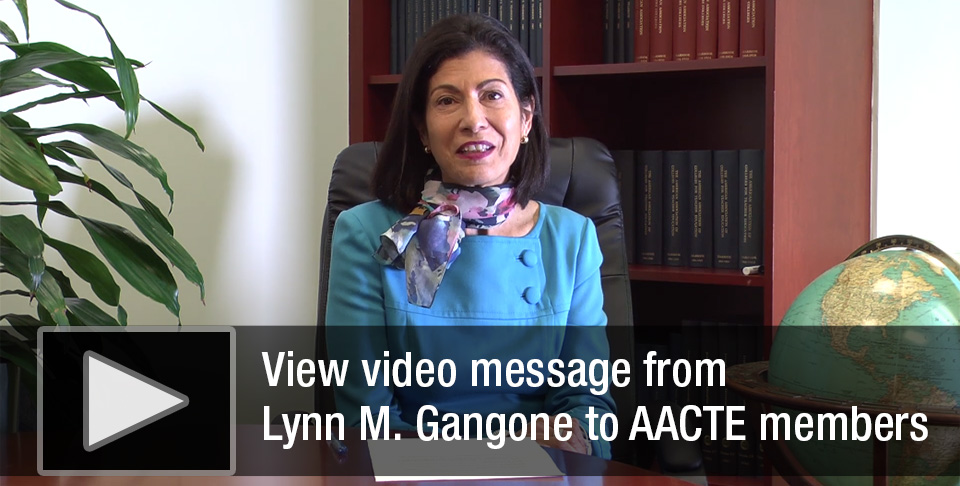
AACTE is committed to high-quality educator preparation and works continually to assist member institutions in understanding what is necessary to engage in quality assurance processes. A recent decision by the AACTE Board of Directors, described in this blog by AACTE Board Chair Renée A. Middleton, reaffirms the importance of a unified national accreditation system that assures our nation’s teacher candidates are of the highest caliber, and clarifies AACTE’s role in the quality assurance environment. The Board and the AACTE national office team are dedicated to listening to and serving our members, and Dean Middleton’s blog reflects that commitment to member value.
One of the primary roles of educators is to prepare learners to become engaged citizens in a 21st-century democratic society. Today’s educators enter highly diverse schools that reflect the breadth of our nation, and AACTE members are committed to ensuring that their candidates are ready and able to be successful with all of their students. National accreditation requires educator preparation providers to address profession-wide standards of excellence and supplies metrics that support high quality by promoting programmatic reflection and continuous improvement. AACTE members embrace accountability measures that demonstrate their programs’ effectiveness and contribute to program improvement.
26 Sep2017
By Jemima Cabedo
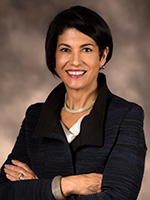
In a
recent podcast with Enrollment Fuel, the organization’s president, Jacquelyn D. Elliott, interviewed AACTE President/CEO Lynn M. Gangone about what leadership means. The following summary highlights the conversation.
Opening the interview with a question about her definition of leadership, Gangone explained it as the process of orchestrating change “with people and for people” – that is, while the individual leader may have the power to implement change, the collective team is where change happens.
26 Sep2017
By Lynn M. Gangone
The greatest benefit of an association is the collective effort of its members to identify and then advance shared values. In the 2016 Harvard Business Review article “The Ecosystem of Shared Value,” the authors describe collective impact as a movement that successfully brings together various actors in their ecosystems to catalyze change. In the ecosystem of educator preparation, every individual AACTE member plays a critical role in creating a collective voice that impacts American education today and beyond. Through members’ active engagement, AACTE is empowered to achieve successes beneficial to our entire professional community and the students we serve.
Leading into this academic year, I have been highlighting AACTE’s core principles as they reflect members’ shared values and the driving force of our work. This month, I celebrate AACTE’s core values around scholarship and knowledge production, which represent your commitment to high research standards and to producing scholarship that contributes to educational practice. AACTE, its members, and its collaborative partners stand ready as a collective voice to effect educational and social change.
22 Aug2017
By Lynn M. Gangone
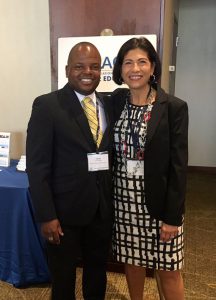
The AACTE Quality Support Workshop this month was an inspirational model of improvement in action. During my 3 days in Minneapolis, I witnessed a profound commitment among participants to ensure high levels of quality in their programs. Understanding standards and evidence more deeply, using data more strategically, and creating more effective quality assurance systems were some of the topics covered.
Dedication to continuous improvement is shared by AACTE’s members and the Association itself. To that end, the AACTE team is focusing the first part of this new academic year on an extensive review of the organization’s operations and programs, facilitated by an experienced consulting firm with assistance from a staff steering committee (see this recent article by Vice President Rod Lucero). In addition, an Association-wide member survey launches in September, and we’re counting on your participation to inform our work going forward. AACTE is always looking to improve and meet the changing needs of the membership.
01 Jun2017
By Kristin McCabe
Today, AACTE welcomes Lynn M. Gangone to the position of president and chief executive officer. Gangone graciously took time during her first day on the job for this introductory interview for Ed Prep Matters:
Q: Your career has spanned a variety of higher education and association roles. What attracted you to AACTE?
A: AACTE’s mission is the first and foremost attraction. In my opinion, educators are the most important professionals in our society, and the opportunity to serve an organization dedicated to their preparation is unparalleled. Not only have educators made a difference in my life, but I have had the extraordinary fortune to “pay it forward” through my career as a faculty member and a dean. AACTE aligns so many facets of my lifelong work as an educator with service to and advocacy for educator preparation programs.
30 May2017
By Sharon Robinson
Leaving office as president and CEO of AACTE is truly bittersweet. First, the bitter part: After 12 years, I am acutely aware of many good reasons to retire from this office in spite of my abiding passion for the profession and causes of equity. At this moment, it is clear to me that my passion for the work is far outpaced by the energy required to get it done.
Now, for the sweet part (albeit severely summarized):
 I am excited to report that the AACTE Board of Directors approved a new Strategic Plan framework during their meeting in Washington, DC last month. Our Board adopted new vision and mission statements that are bold, innovative, and will facilitate building the Association’s overall strategic plan. Please take a few minutes to watch the video above (or read the transcript) to learn more about your Association’s new direction.
I am excited to report that the AACTE Board of Directors approved a new Strategic Plan framework during their meeting in Washington, DC last month. Our Board adopted new vision and mission statements that are bold, innovative, and will facilitate building the Association’s overall strategic plan. Please take a few minutes to watch the video above (or read the transcript) to learn more about your Association’s new direction.
















